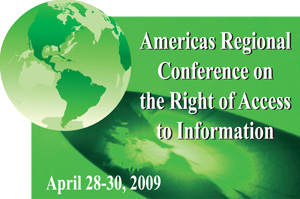DARCE FARDY ON THE CARTER CENTER: “AMERICA’S REGIONAL CONFERENCE ON THE RIGHT OF ACCESS TO INFORMATION”: April 28-30, 2009
DARCE FARDY ON THE CARTER CENTER:
“AMERICA’S REGIONAL CONFERENCE ON THE RIGHT OF ACCESS TO INFORMATION”: April 28-30, 2009
From left: Darce Fardy – President of the Right to Know Coalition of Nova Scotia, Jim Bronskill of the Canadian Press, former US President Jimmy Carter, and David Gollob of the Canadian Newspaper Association. Photo Credit: Brent N. Fuller, Cayman Free Press, brent@cfp.ky
For anyone interested in government openness and accountability, Lima, Peru was the place to be. Organized by the Carter Center advocates and government representatives from North and South America to exchange ideas on how best to 'establish the next steps in ensuring universal access to information'.
The Carter Center promoting human rights around the world, was established by the former President of the United States, Jimmy Carter, when he left office. One of its main projects this year was to gather access to information advocates from Latin America, the United States, and Canada at a conference in Lima, Peru.
The conference was organized in collaboration with the Organization of American States (of which Canada is a member); the Knight Center for Journalism in the Americas and; Commision Andina de Juristas,
The Prime Minister of Peru, Yehude Simon, opened the conference and President Carter spoke at a plenary session.
115 participants from 18 countries represented governments, civil society organizations, international bodies and financial institutions, donor agencies and foundations, the private sector and the media. Those attending from Canada were Suzanne Legault, Canada’s Assistant Information Commissioner; Jim Bronskill of Canadian Press; David Gollob of the Canadian Newspaper Association and me as founder and President of the Right to Know Coalition of Nova Scotia. (In his speech to the plenary session, former President Carter welcomed delegates “all the way from Nova Scotia to Argentina”.)
The mission of the conference was to develop a plan of action for “the Advancement of the Right of Access to Information”. Recognizing that access to information is a fundamental human right, it was noted that throughout the Americas citizens chronically lack confidence in the political system and that the lack of transparency of governments is the cause.
This was particularly applicable to Canada where low voter turnouts are seen as a threat to democracy. Almost half of the eligible voters bothered to cast ballots in this year’s provincial election in British Columbia. The same is happening in most if not all provinces and territories and particularly at the federal level. There are likely other causes for this civic disengagement in the political system in Canada but there should no doubt that governments are failing to involve citizens in the decision making process.
In advance of the conference those attending were invited to meet with representatives of the World Bank which was meeting at the same time. The World Bank is in the process of adopting an access to information policy for its member countries and wanted the views of those of us attending the access to information conference. A suggestion that under the Bank’s proposal appeals of decisions would be handled by a senior officer of Bank concerned many of us who pointed out that such an arrangement would do considerable harm to the integrity of any access to information policy. Concern was also expressed that some information held by the World Bank would not be subject to the access to information policy.
The conference broke into five working groups to consider the various issues that arise when discussing access to information legislation. The group I participated in discussed an issue that our Right to Know Coalition of Nova Scotia is wrestling with: how to make more people aware of their rights to information and how to encourage more of them to use the Act.
Other working groups discussed advancing openness; creating an environment for transparency and; the roles and responsibilities of governments, advocacy groups, and citizens.
Although Canada’s position, with Freedom of Information Acts in all the provinces and territories as well as at the federal level may be envied, Canada’s Acts also suffer from neglect by those in power. It seems even politicians who promote freedom of information legislation during election campaigns lose their enthusiasm for it when or if they get into power.
.
Those who promote or use the federal Access to Information Act (ATI) believe it’s broken, despite promises made in a recent federal election campaign to make accountability and openness in government a priority.
In Nova Scotia, where the Act has a strong and clear purpose (requiring government to be “fully accountable”) and its reach is wide ( municipalities, regional development authorities, universities, school boards and hospitals) high costs and long waiting times discourage citizens. Applicants have faced costs of over a thousand dollars and others have had to wait for as long as eighteen months for a resolution.






